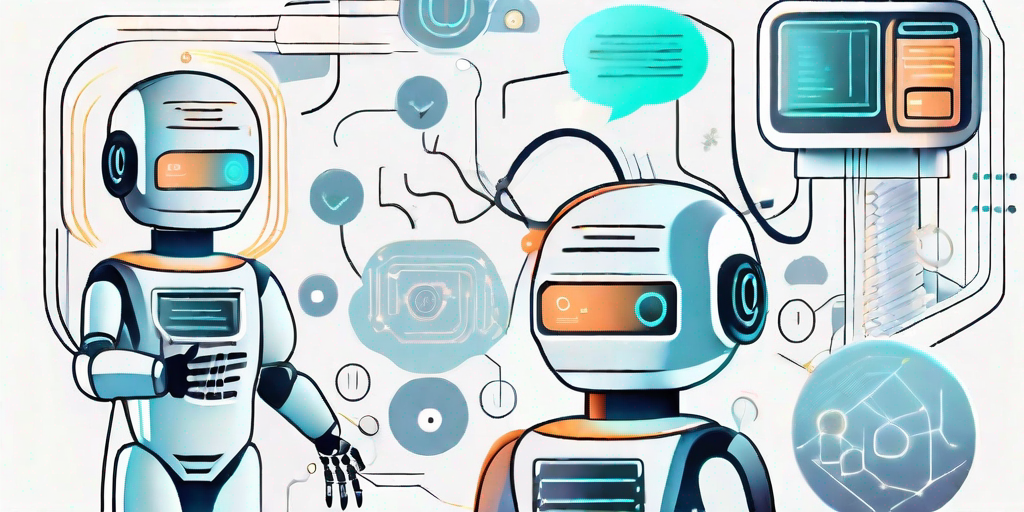Understand Natural Language Processing with a Futurist Speaker

Understand Natural Language Processing with a Futurist Speaker
Natural Language Processing (NLP) is revolutionizing the way we interact with technology. From voice assistants like Siri and Alexa to chatbots and language translation systems, NLP is at the forefront of this transformation. But what exactly is NLP, and how does it work? In this article, we will explore the basics of NLP and delve into the insights provided by a futurist speaker. By the end, you'll have a better understanding of NLP and its impact on business and society.
Understanding the Basics of Natural Language Processing
At its core, Natural Language Processing (NLP) is a subfield of artificial intelligence (AI) focused on enabling computers to understand, interpret, and respond to human language. It involves the development of algorithms and models that can process, analyze, and generate natural language text or speech. NLP encompasses a wide range of tasks, including sentiment analysis, language translation, text categorization, and information extraction.
One of the key challenges in NLP is dealing with the complexity and ambiguity of human language. Unlike programming languages, which have strict syntax and rules, human language is full of nuances, idioms, and variations. NLP systems need to be able to handle these complexities and understand the meaning behind the words.
NLP systems utilize a combination of statistical modeling, machine learning, and computational linguistics techniques to extract meaning from human language. These systems can process unstructured text data, such as emails, social media posts, articles, and customer reviews, and derive valuable insights from them.
For example, imagine a chatbot that can converse with you in a natural and human-like way. NLP algorithms enable the chatbot to understand your questions or statements, find the most relevant information, and provide accurate responses. This requires the system to understand context, tone, and intent, as well as to infer meaning from ambiguous or incomplete queries.
In order to achieve this level of understanding, NLP systems employ various techniques. One common approach is to use machine learning algorithms to train models on large datasets of labeled text. These models learn patterns and relationships between words and phrases, allowing them to make predictions and generate responses based on new inputs.
Another important aspect of NLP is sentiment analysis, which involves determining the emotional tone of a piece of text. This can be useful for companies that want to gauge customer satisfaction based on online reviews or social media posts. By analyzing the sentiment of these texts, NLP systems can provide valuable insights into customer opinions and preferences.
Language translation is another area where NLP has made significant advancements. With the help of machine learning algorithms, NLP systems can now translate text from one language to another with impressive accuracy. This has opened up new possibilities for global communication and collaboration.
Text categorization is another important task in NLP. By analyzing the content and structure of a piece of text, NLP systems can automatically assign it to a predefined category or topic. This can be useful for organizing and searching large collections of documents, such as news articles or research papers.
Information extraction is yet another application of NLP. By analyzing text data, NLP systems can identify and extract specific pieces of information, such as names, dates, locations, or numerical values. This can be useful for tasks such as extracting data from resumes or extracting key information from legal documents.
In conclusion, Natural Language Processing is a fascinating field that combines linguistics, machine learning, and artificial intelligence to enable computers to understand and interact with human language. From chatbots to language translation, NLP has a wide range of applications that are transforming the way we communicate and interact with technology.
Insights into Future Trends from a Futurist Speaker
A futurist speaker brings a unique perspective to the field of NLP. They have the ability to identify emerging trends and predict the future impact of NLP on various industries. By analyzing data and observing technological advancements, a futurist speaker can paint a picture of what the future holds.
One key trend highlighted by futurist speakers is the increasing integration of NLP into everyday devices and applications. Voice assistants will become even more ubiquitous, with improved capabilities to understand complex queries and provide more accurate responses. Imagine a world where you can simply speak to your smartphone or smartwatch and have it perform tasks for you effortlessly. NLP will also play a crucial role in the development of smart homes, virtual reality, and augmented reality experiences. Imagine walking into your home and having the lights, temperature, and music automatically adjust to your preferences, all thanks to NLP technology.
Another trend to watch out for is the ethical implications of NLP. Futurist speakers emphasize the importance of responsible AI development, ensuring that NLP systems are unbiased and respect privacy and security. As NLP becomes more pervasive, we must carefully navigate the ethical challenges it presents, such as the potential for manipulation and misinformation. Imagine a world where NLP is used to create deepfake videos that are indistinguishable from reality, leading to widespread confusion and distrust. It is crucial that we address these ethical concerns and establish guidelines for the responsible use of NLP technology.
Furthermore, futurist speakers also predict that NLP will revolutionize the healthcare industry. Imagine a future where doctors can use NLP-powered systems to analyze patient data and make accurate diagnoses in a fraction of the time it currently takes. NLP can also be used to improve patient care by providing personalized treatment recommendations based on individual medical histories and genetic profiles. This could lead to more efficient and effective healthcare delivery, ultimately saving lives.
Additionally, futurist speakers foresee NLP playing a significant role in the education sector. Imagine a classroom where students can interact with virtual tutors powered by NLP, receiving personalized feedback and guidance tailored to their individual learning styles. NLP can also be used to create immersive educational experiences, allowing students to explore historical events or scientific concepts in a virtual environment. This has the potential to revolutionize the way we learn and make education more engaging and accessible to all.
In conclusion, futurist speakers provide valuable insights into the future trends of NLP. From the increasing integration of NLP into everyday devices to the ethical implications and its potential impact on healthcare and education, NLP is poised to shape our future in profound ways. It is important to embrace these advancements while also being mindful of the ethical considerations, ensuring that NLP technology is developed and used responsibly for the benefit of society.
The Role of Natural Language Processing in Technology Evolution
Natural Language Processing (NLP) has played a pivotal role in the evolution of technology, revolutionizing the way we interact with our devices and opening up new possibilities for innovation and automation. As NLP continues to advance, it will pave the way for even more intuitive and seamless human-computer interactions.
One area where NLP has made significant advancements is in language translation. Gone are the days of cumbersome, inaccurate machine translations. With the help of NLP, translation systems now have the ability to understand the nuances of different languages, resulting in more accurate and natural translations.
But the impact of NLP goes beyond just language translation. It has immense potential in various industries such as healthcare, finance, and customer service. In the healthcare industry, NLP can assist medical professionals in analyzing patient records and extracting valuable insights. By processing vast amounts of medical data, NLP algorithms can identify patterns and trends that may not be immediately apparent to human analysts. This can lead to more accurate diagnoses, personalized treatment plans, and improved patient outcomes.
In the finance industry, NLP algorithms can process large volumes of financial data to identify trends and make informed investment decisions. By analyzing news articles, social media posts, and other textual data, NLP can help financial analysts gauge market sentiment, predict stock price movements, and assess the impact of news events on the financial markets. This can give investors a competitive edge and help them make more informed and profitable investment choices.
Customer service is another area where NLP has made significant strides. Chatbots equipped with NLP capabilities can provide personalized and efficient support to customers, reducing the need for human intervention. These chatbots can understand and respond to customer queries in a natural language, providing timely and accurate assistance. By leveraging NLP, companies can improve customer satisfaction, reduce response times, and handle a larger volume of customer inquiries.
Furthermore, NLP has also found applications in sentiment analysis, information extraction, text summarization, and question-answering systems. Sentiment analysis uses NLP techniques to determine the sentiment expressed in a piece of text, which can be valuable for understanding customer feedback, social media sentiment, and public opinion. Information extraction involves extracting structured information from unstructured text, enabling automated data analysis and decision-making. Text summarization techniques can condense large amounts of text into concise summaries, making it easier for users to digest information quickly. Question-answering systems, powered by NLP, can understand and respond to user queries, providing accurate and relevant answers.
In conclusion, NLP has had a profound impact on technology evolution, transforming various industries and enabling more sophisticated and intuitive human-computer interactions. From language translation to healthcare, finance, and customer service, NLP continues to push the boundaries of what is possible, opening up new opportunities for innovation and automation.
The Futurist Speaker's Approach to Decoding Natural Language Processing
A futurist speaker brings a fresh approach to decoding NLP by examining the underlying principles and technologies. They can break down complex concepts into understandable terms and shed light on the inner workings of NLP systems.
The speaker may discuss the importance of pre-training models, such as transformers, which can learn to generate high-quality and contextually relevant responses. They may also explore the role of neural networks in NLP and the use of attention mechanisms to capture dependencies between words. By demystifying these technical aspects, the futurist speaker empowers the audience to grasp the significance of NLP and its potential applications.
The Impact of Natural Language Processing on Business and Society
The impact of NLP on business and society is profound and far-reaching. In the business world, NLP has revolutionized customer service, allowing companies to provide instant and personalized support. It has also enabled more efficient data analysis, helping organizations make data-driven decisions and gain a competitive edge.
On a societal level, NLP has the potential to bridge the language gap and facilitate communication between people of different cultures and backgrounds. It can also enhance accessibility for individuals with disabilities, enabling them to interact with technology in more meaningful ways.
However, with its power and potential, NLP also brings challenges. Privacy concerns, ethical considerations, and the potential for biases in NLP algorithms must be carefully addressed. Futurist speakers can help explore these issues and guide businesses and policymakers towards responsible and inclusive NLP implementation.
In conclusion, understanding NLP is crucial in today's rapidly evolving technological landscape. By embracing the insights provided by futurist speakers, we can unlock the full potential of NLP and navigate its impact on business and society. Whether it's improving customer experiences, enabling smarter devices, or driving innovation, NLP continues to shape the way we interact with technology. So, let's dive deep into the world of NLP and embrace the future it holds.
FAQ
What is Natural Language Processing (NLP)?
Natural Language Processing (NLP) is a subfield of artificial intelligence (AI) that focuses on enabling computers to understand, interpret, and respond to human language. It involves the development of algorithms and models that can process, analyze, and generate natural language text or speech.
How does NLP work?
NLP systems utilize a combination of statistical modeling, machine learning, and computational linguistics techniques to extract meaning from human language. These systems can process unstructured text data, such as emails, social media posts, articles, and customer reviews, and derive valuable insights from them.
What are the future trends and applications of NLP?
Futurist speakers predict that NLP will continue to be integrated into everyday devices and applications, leading to more seamless human-computer interactions. They also highlight the ethical implications of NLP and its potential impact on industries like healthcare and education. NLP is expected to revolutionize the way we communicate, learn, and access healthcare services.
Contact a Futurist Speaker for your event
Are you looking to bring a fresh and insightful perspective to your next event? Look no further than Dr. Mark van Rijmenam, a renowned futurist speaker with expertise in Natural Language Processing (NLP) and its impact on business and society. Dr. van Rijmenam has a deep understanding of the latest trends and advancements in NLP, and he can provide your audience with valuable insights into the future of technology and its implications.
By hiring Dr. Mark van Rijmenam as your futurist speaker, you can ensure that your event stands out and leaves a lasting impact on your audience. Dr. van Rijmenam's engaging and captivating speaking style, combined with his in-depth knowledge of NLP, will captivate your audience and spark meaningful discussions.
To book Dr. Mark van Rijmenam as your futurist speaker, simply complete the form below and we will be in touch within 24 hours. Don't miss out on the opportunity to bring the future of NLP to your event and inspire your audience with the possibilities it holds.
Thanks for your inquiry
We have sent you a copy of your request and we will be in touch within 24 hours on business days.
If you do not receive an email from us by then, please check your spam mailbox and whitelist email addresses from @thedigitalspeaker.com.
In the meantime, feel free to learn more about The Digital Speaker here.
Or read The Digital Speaker's latest articles here.





